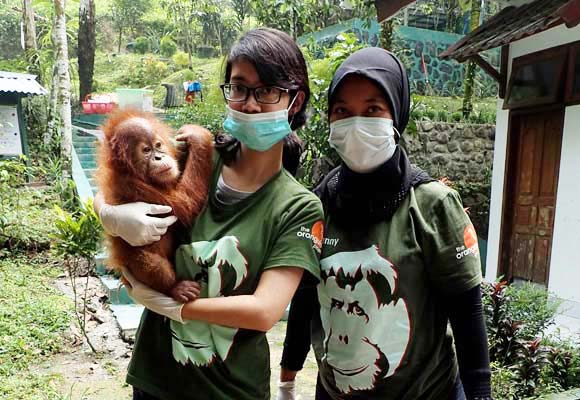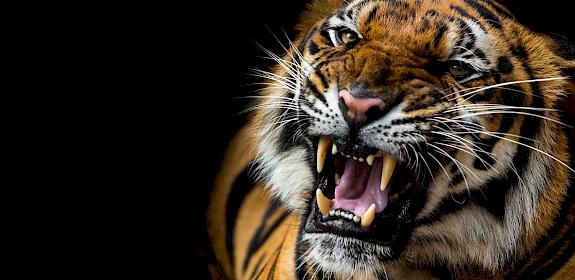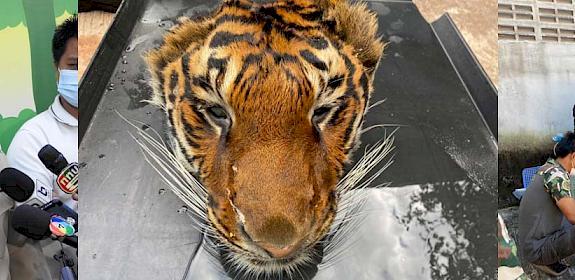Seized orangutans repatriated
Kuala Lumpur, Malaysia, 20th October 2015—Two Sumatran Orangutans seized in July this year arrived safely back in Indonesia today. The Department of Wildlife and National Parks Peninsular Malaysia (PERHILITAN) announced their forthcoming repatriation at a press conference yesterday and the animals are now at the Sumatran Orang Utan Conservation Programme’s Quarantine Centre in Medan, North Sumatra.

Four months ago, PERHILITAN found the orangutans in a duffel bag in a hotel car park in a town 50 km outside Kuala Lumpur. Two Indonesians, believed to be part of a trafficking syndicate, were arrested along with two Malaysians.
The animals had been advertised for sale via a clandestine Facebook group. Over the past year, this method of illegal trading has been on the rise throughout Malaysia, and authorities have already made a number of successful arrests and convictions of those engaged in online wildlife trafficking.
All four of those arrested were charged with four counts for the illegal possession of juvenile orangutans and willfully causing unnecessary suffering to the animals under two sections of the Wildlife Conservation Act 2010.
At the time, all four pleaded not guilty and were held on bail of MYR45,000 (USD10,500). In September, additional charges were brought against the two Indonesian suspects for illegal importation of the animals for which an additional bail of MYR20,000 (USD4700) was imposed on each of them.
Subsequently, one of the accused changed his plea to guilty on all five charges and received a six month sentence, effective from the day of his arrest. The single charge of importing a totally protected species without the necessary permit carries a mandatory fine of between MYR30,000 and MYR100,000 (USD7,000–25,500) and a jail term of up to three years under the Wildlife Conservation Act 2010. The additional four charges he faced can cumulatively result in maximum fines of up to MYR500,000 (USD76,400) and/or prison time of up to 22 years. The Department announced yesterday that the Deputy Public Prosecutor has filed a notice of appeal against the low sentence.
Dr Ian Singleton, the Director of the Sumatran Orang Utan Conservation Programme said that orangutan females have just one infant every 8 or 9 years, and only 4 or 5 in their lifetime and because of this extremely slow reproductive rate, computer modelling has shown that the loss of just 1% of females from a population sends it crashing. Female orangutans will also defend their young to the death and thus are usually killed by poachers seeking their offspring.
“The arrest of the suspects and subsequent repatriation of the orangutans took place inside three months, and TRAFFIC commends PERHILITAN for their swift action: it is pleasing to see that the two animals have been given a second chance at a life in the wild,” said Dr Chris R. Shepherd, Regional Director of TRAFFIC in Southeast Asia.
The two young animals will now embark on the long process of rehabilitation almost immediately, increasing the chances of successful release in the future.
This is the second repatriation of smuggled orangutans this month. In July 2015, Kuwaiti authorities seized two baby orangutans smuggled into the country from Indonesia. The oldest was repatriated earlier this month, the youngest, estimated to be just six months old will be sent back once she is a little older.
The two species of orangutans are found only on the islands of Sumatra and Borneo. The Sumatran Orangutan Pongo abelii has been assessed as Critically Endangered by the IUCN; whilst the Bornean Orangutan Pongo pygmaeus found in Malaysian and Indonesian Borneo is considered Endangered. The loss of habitat in both Sumatra and Borneo caused by forest clearance and destruction for agriculture, mining and infrastructure places individuals at greater risk of conflict with humans, providing increased opportunities for poachers. Orangutans are listed in CITES Appendix I meaning that commercial international trade is prohibited.
TRAFFIC’s research has highlighted the trade in orangutans within Indonesia; our current work focuses on the ape trade in Peninsular Malaysia and Thailand, where orangutans are traded as pets and for display in zoos and other wildlife attractions.



